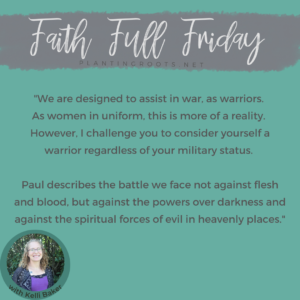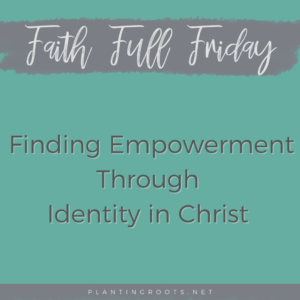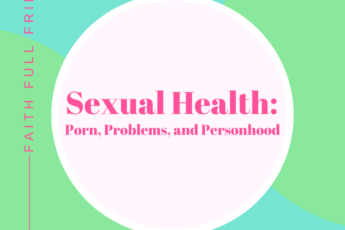Finding empowerment through our identity in Christ has Kelli taking us back to the Creation story in part one of this two-part article on Women’s Empowerment.
Finding Empowerment Through Our Identity in Christ
by Kelli Baker
When we understand our identity in Christ, we are empowered to operate with freedom and peace. So how do we go about finding empowerment through our identity in Christ? How do we even know who we are in Christ?
To answer that, we have to be rooted in Christ before anything else.
Recently, I (Kelli) took a Biblical Womanhood class and we began by studying why God created women in the first place. This sounds like a pretty good starting point as we discuss women’s empowerment this month. Let us set the foundation for who we are by going back to the beginning, so we have a correct understanding of God’s intended purpose for women specifically.
From the Creation
“In the beginning, God created the heavens and the earth.” (Genesis 1:1).
Moses, the author of Genesis, describes how God created the earth and all living things. Upon the completion of each day, God saw that it was good.
Then God said, “Let us make man in our image, after our likeness.” (Genesis 1:26a).
Man and woman are formed. After God created man and woman in his image, he blessed them.
We notice in the creation story that the only creatures God created in his image were man and woman. We are uniquely set apart from the rest of creation and given dominion over every living thing. Reading the text in its entirety, we see the Trinity present from the very beginning. When God created man “in our image” and “after our likeness,” he referred to the Trinity. We know the Trinity to be the Father, Son, and Holy Spirit. While the Trinity is made up of three persons, each distinct person is equal yet diverse and unified.
Man and woman were created in the same way.
We were created to live in oneness.
In Genesis 2, we learn that God created woman to be a helper for man. God looked saw that man needed a companion. “Then God said, “It is not good that the man should be alone; I will make a helper fit for him.” (Genesis 2:18). The Hebrew word for helper here is ezer, which can be translated as help, aid, or succor. According to Merriam-Webster’s dictionary, the definition of succor is “relief; aid; or help.”
Finding Empowerment
 In the Old Testament, ezer describes God’s assistance in times of desperate need of deliverance or protection from enemies.
In the Old Testament, ezer describes God’s assistance in times of desperate need of deliverance or protection from enemies.
- In Exodus 18:4, Moses refers to God as the one who helped and delivered the people from Pharaoh’s sword.
- Moses encourages the Israelites to continue pressing onward because they have the help of God as their shield in Deuteronomy 33:29.
- The Psalmist in Psalm 115 urges them to trust in the Lord as he describes God as their help and shield.
With this framework, we can conclude that women were designed and empowered for far more than we may have been given credit for in the past.
We are designed to assist in war, as warriors. As women in uniform, this is more of a reality. However, I challenge you to consider yourself a warrior regardless of your military status. Paul describes the battle we face not against flesh and blood, but against the powers over darkness and against the spiritual forces of evil in heavenly places (Ephesians 6:12 paraphrased).
While our role was intended to be a helper, that does not explain who we are. We are first and foremost children of God. However, the fall caused sin to enter the world, and the need for a Savior to reconcile begins.
Identity in Christ
God loves us so much that he sent his Son so we might be alive with Christ. Paul refers to a spiritual life here.

Only by God’s grace have we been saved and ushered into a new life in Christ.
We can see this in Ephesians 2:4-6 which says, But God, being rich in mercy, because of the great love with which he loved us, even when we were dead in our trespasses, made us alive together with Christ—by grace you have been saved— and raised us up with him and seated us with him in the heavenly places in Christ Jesus.
Understanding our position in Christ gives us strength, endurance, and confidence to walk in our identity. We are seated with Christ in heavenly places; because of this, we have the power of the Spirit within us to live confidently and freely. We can stand empowered to live out our role as warriors when we fully grasp our identity in Christ.
Our identity should not be rooted in our roles here on earth but in God’s love for us. While, as women, we were created as helpers and companions, our part does not define us. We do not find our identity in our role as helpers or companions; instead, we rely on God’s love. Next week, we will explore the idea of living out our identity in Christ regardless of our roles.
Closing Prayer
Dear Heavenly Father, thank you for the love you extended to us on the cross. Help us always be mindful of your love and rooted in our identity as daughters of the one true King first and foremost. Amen.
Notes and Resources
- Strong’s Hebrew: 5828. עֵ֫זֶר (ezer) — a help, helper (biblehub.com)
- Look for part two of this article next week!
- Read the introduction for our Faith Full Friday series here.
- Read the intro to our month of discussion on Women’s Empowerment here.
- Look for a fantastic Deeply Rooted Podcast episode on Women’s Empowerment here.






